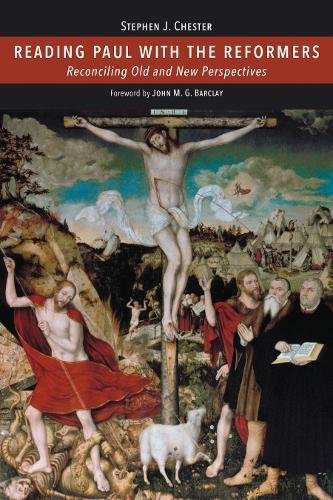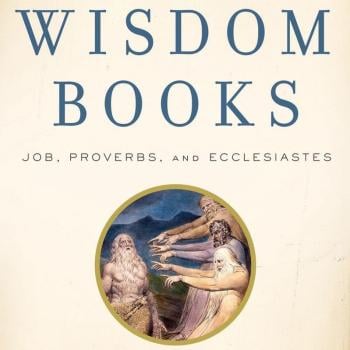Ben. The discussion by Luther and Melanchthon on the meaning of ‘en auto’ in 2 Cor. 5.21 is interesting. ‘en’ (plus the dative) can mean many things other than ‘in’. It can mean for example ‘by’. Furthermore, ‘auto’ can mean it rather than him. So for example in Rom. 1.17 it probably means the righteousness of God is revealed in it (i.e. in the Gospel), not ‘in him’. And in 2 Cor. 5.21 it could certainly read ‘and the one not knowing sin was made sin for us in order that we might become the righteousness of God ‘by it’ or even ‘in it’ (with ‘it’ in this case referring to the atoning death of Christ). And again, the assumption that dikaiosune tou theou refers not to the righteousness of God, as it clearly does in Rom. 1, but to the righteousness of Christ is dubious.
In other words, much hangs for both these Reformers on a certain kind of reading both of the prepositions involved with dative objects and the phrase itself which is assumed to refer to Christ not God’s righteousness. But nowhere in the Corinthian correspondence does Paul call Christ God or God’s righteousness if not in the above reference, and the only reference to Christ as God in Romans is in the debatable doxological in Rom. 9.5. The first-time listeners in Rome to Rom. 1 would never guess Rom. 1.16-17 refers either to Christ’s righteousness or to ‘God’s covenant faithfulness’.
One more thing, the other supposed reference to Christ as our righteousness in 1 Cor. 1.30 isn’t— it reads as follows ‘But from Him (the antecedent is theou) you are, in Christ Jesus (who is our Wisdom from God), righteousness and holiness and redemption.’ Clearly, Christ is called our wisdom here, but the diagraming of the sentence shows that you is the subject, are is the verb, and the object of the main clause is righteousness etc. In other words, this is not about Christ being something for us, it’s about what we become when we are in Christ, in his body.
Note, ‘he was made sin’ does not mean ‘he was made a sinner’ (and so us) so that we might become Him through union with him. ‘He became sin’ likely refers to his becoming the sin bearer who takes away the sins of the world (ala scapegoat), or it refers to his taking the punishment for our sins in our place.
This very sort of argument shows up on pp. 279ff. of your book between Erasmus and Calvin. Erasmus, focusing on the Greek of Rom. 6.11 quite rightly insists that ‘en’ there likely means by or through, whereas Calvin, following the Vulgate insists it means ‘in Christ Jesus’ because he sees the discussion as about ingrafting into Christ. The same problem crops up with their discussion of 2 Cor. 5.21 where Erasmus says we become the righteousness of God thru Christ, and Calvin says ‘in Christ’. Both renderings of the preposition are quite feasible, but Calvin’s turns the righteousness of God the Father into the righteousness of Christ. He makes the same mistake with 1 Cor. 1.30, quite against the flow of the grammar and syntax of the main clause of that sentence which reads “from God you are….righteousness etc.” There is no way one can render that sentence Christ is our wisdom and our righteousness etc. and do justice to the grammar. There is no ‘kai’ after the subordinate clause which ends with the phrase ‘our wisdom from God’. Comments? Here I part company with this major part of what some of the Reformers seem to be insisting on.
Stephen. I think I might have to write a monograph adequately to answer this question! This is an important debate. On 2 Cor 5:51 I think that translating en auto as “by it” would be odd given that that the main verb in the sentence – “he made” – is clearly describing a divine action of which Christ is the object. If Paul intended to say that we become the righteousness of God “by it” then he did not make himself very clear. An instrumental reading “by him” is certainly possible, but I agree with Con Campbell in Paul and Union with Christ (Zondervan, 2012), pp. 186-87 that the internal logic of the verse supports the idea that believers share in the righteousness of Christ. There is a symmetry to Paul’s argument: since Christ, who knew no sin, was made sin and so shared in the plight of the sinful, sinners are made righteous by sharing in his righteousness.
On 1 Cor 1:30, I would think that if “righteousness, holiness, and redemption” refer to believers and not to Christ then we might expect these attributes to be described as “of God” as at 2 Cor 5:21. Also, while I think I can see how it might be managed without detracting from the finished work of Christ on the cross, is it a likely thing for Paul to describe believers as “the redemption of God?” Are there any parallels to this? Further, if Paul intended to communicate what you propose, he muddied the waters by interrupting his main point to describe Christ as our wisdom from God, whereas if it is correct to see all the nouns as speaking of Christ and who he is for us then the renewed mention of wisdom (see 1:24) makes good sense.















